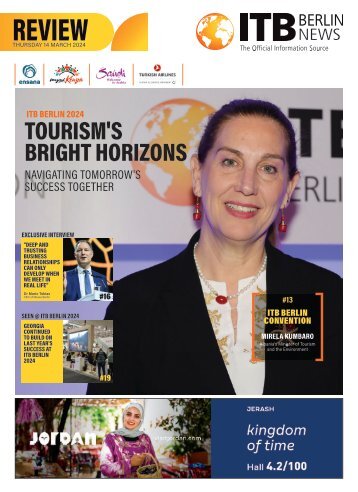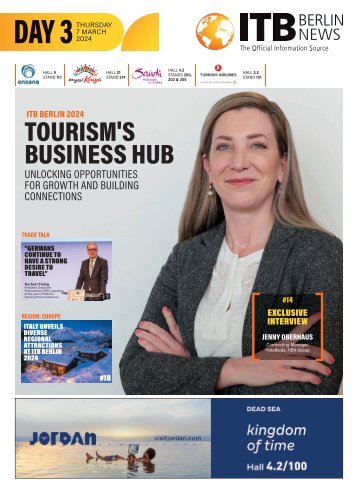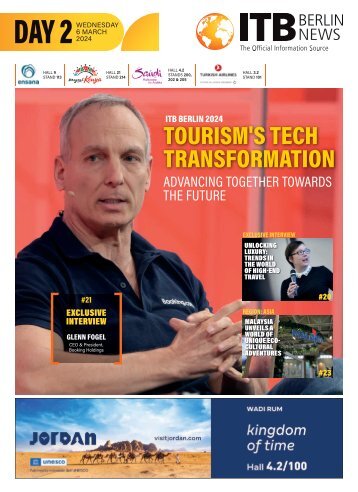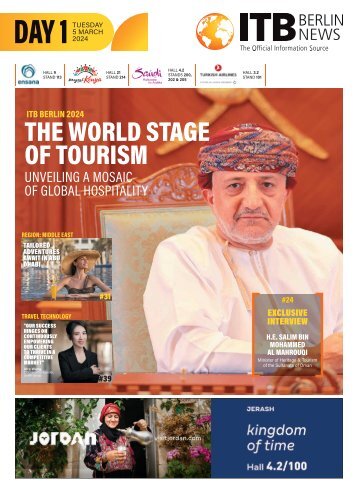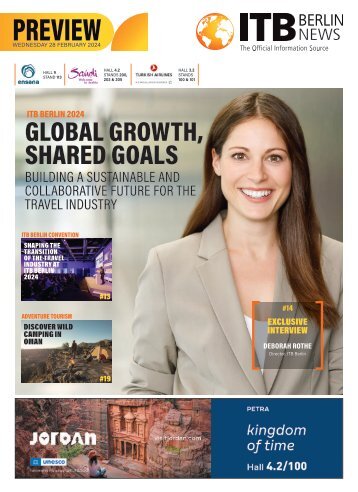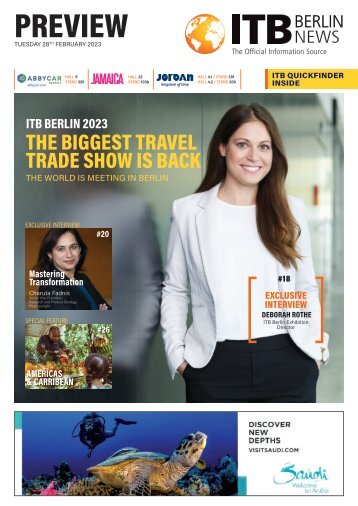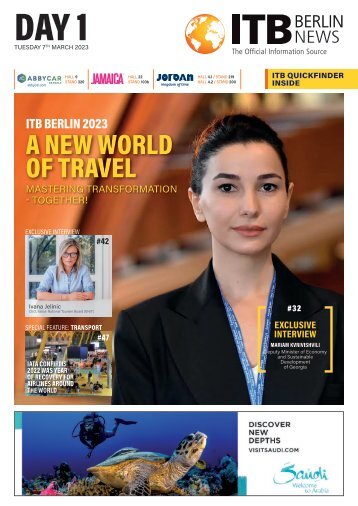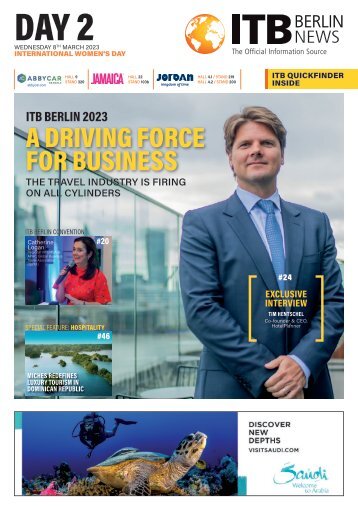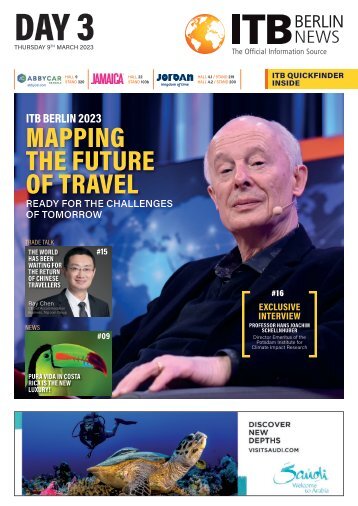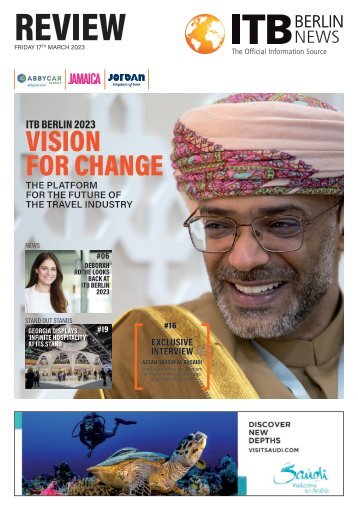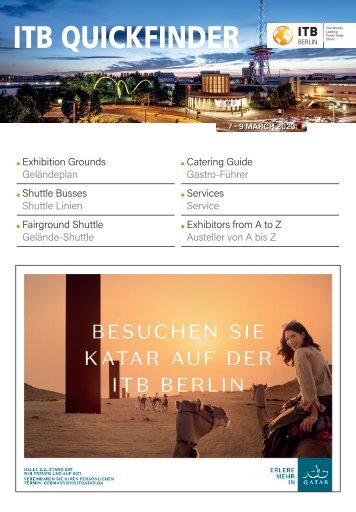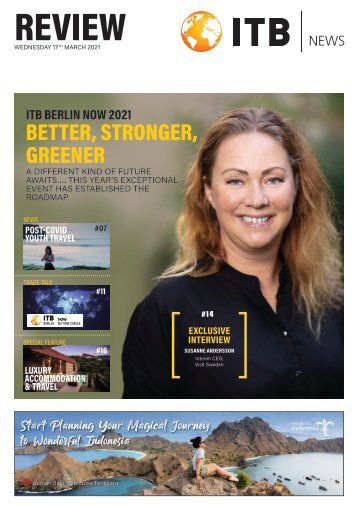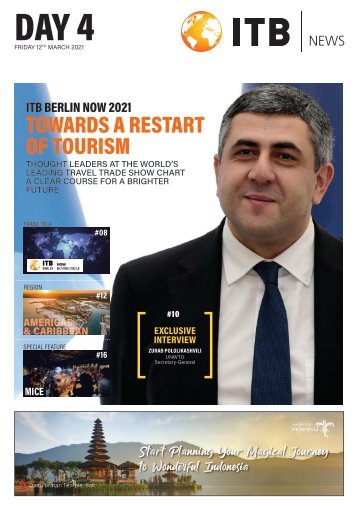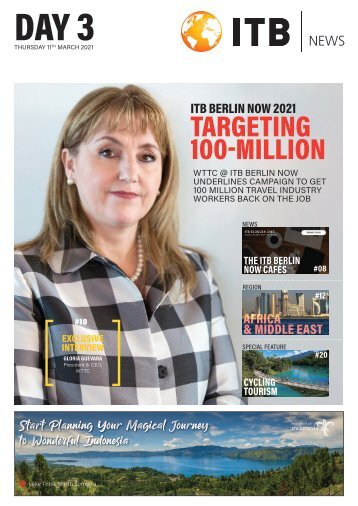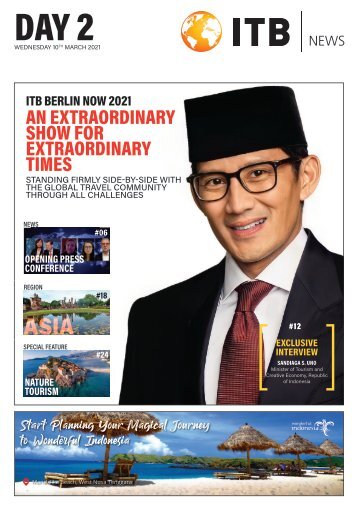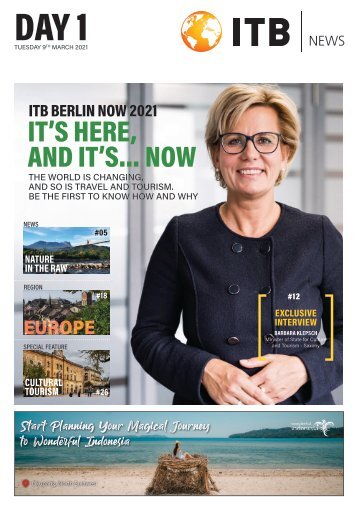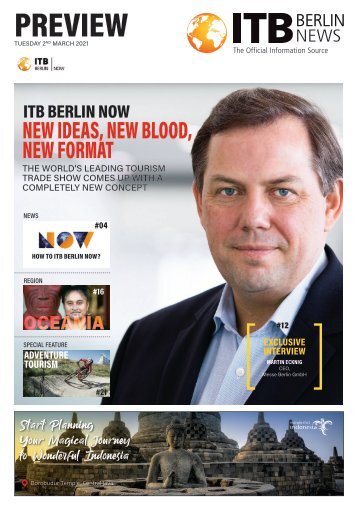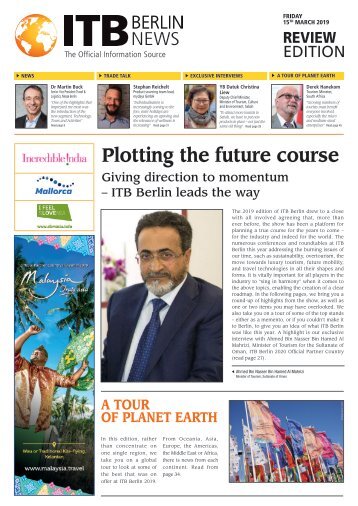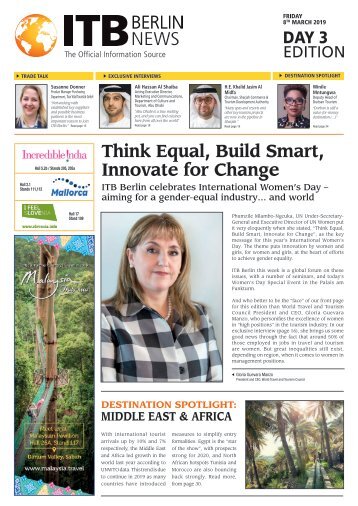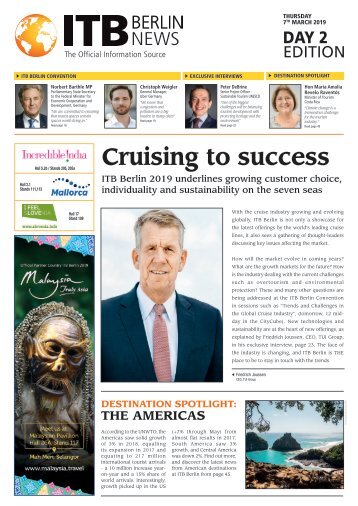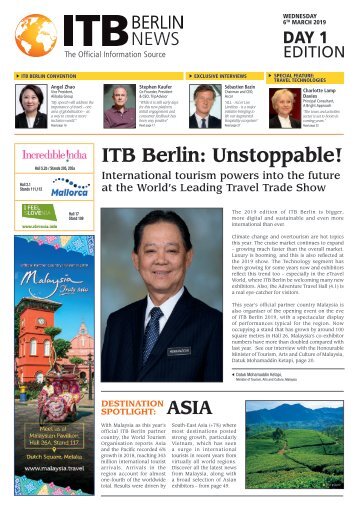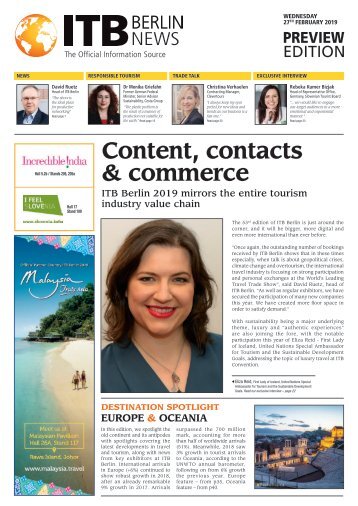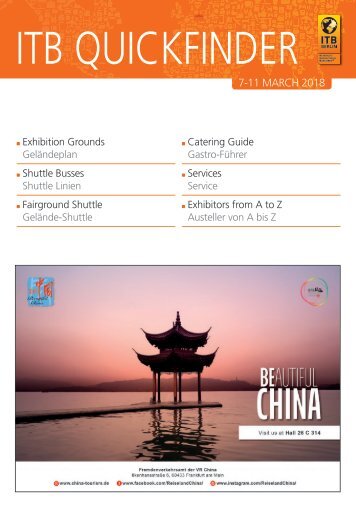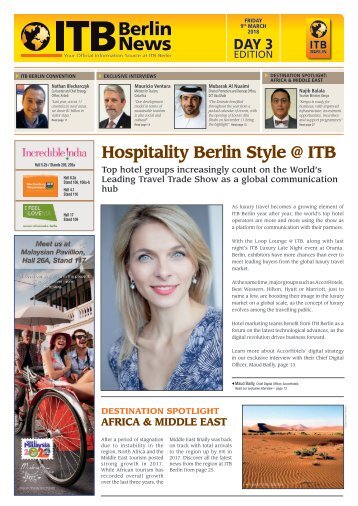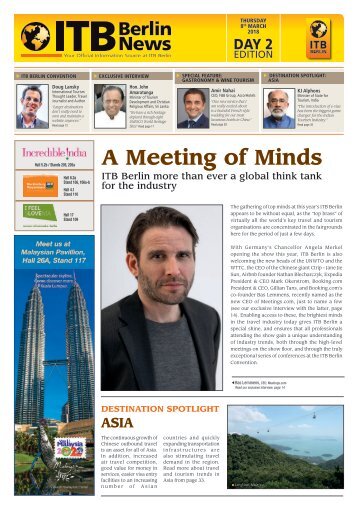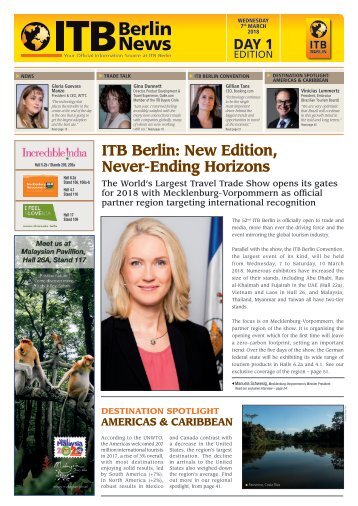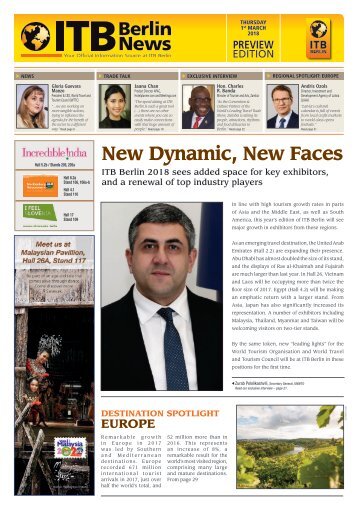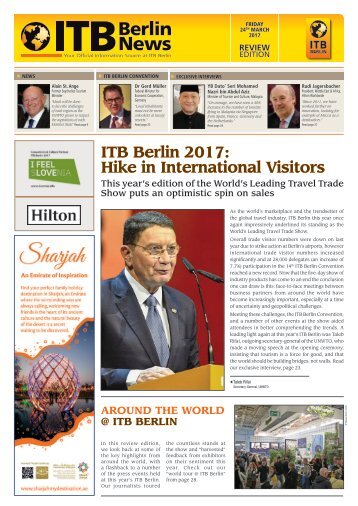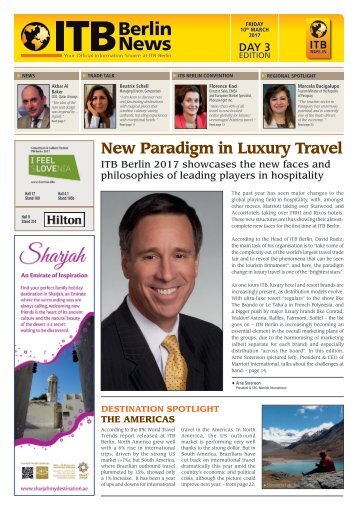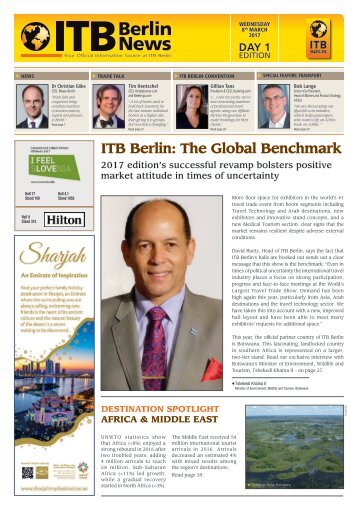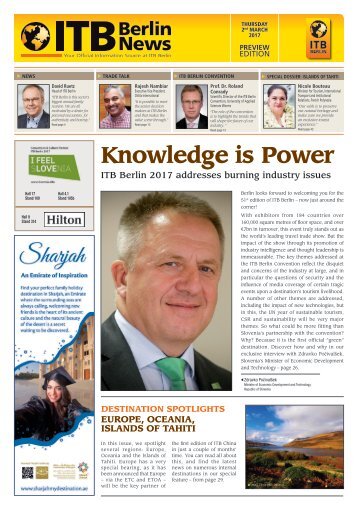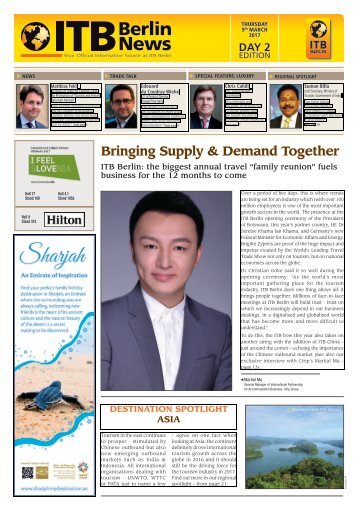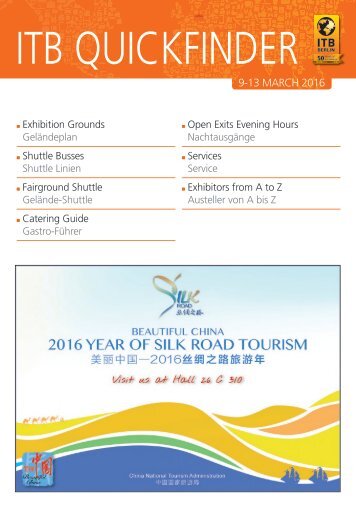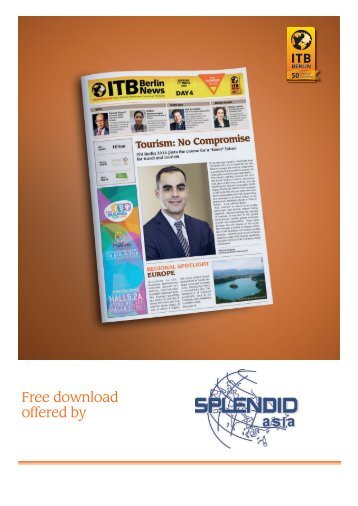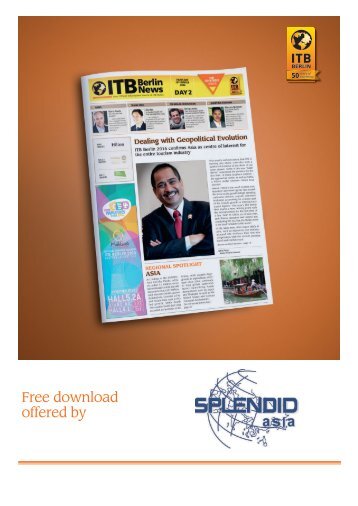
ITB Berlin News - Day 4
- Text
- Berlin
- Tourism
- European
- Lgbt
- Mongolia
- Destination
- Serbia
- Convention
- Tourist
- Vienna
- Www.cleverdis.com
6 ITB
6 ITB BERLIN CONVENTION Space Tourism Lifts Off in 2014 From Virgin Galactic flights to proposed space hotels, exastronaut Prof Dr Ulrich Walter gives us an insight into how important space travel will be for the tourism industry © Messe Berlin A prestigious guest speaker at ITB Berlin, Prof Dr Ulrich Walter, Chair for Space Technology, Technical University Munich has first-hand experience of space travel. Having spent ten days in space in 1993 on the Space Shuttle Columbia’s Spacelab Mission, the German scientist and ex-astronaut is uniquely placed to speak about both the practicalities of space travel and the potential for space tourism. “People trust space travel now,” he said. “It has taken two decades to ensure the technology is ready for tourism. But it is very expensive – it can cost 500m dollars for one shuttle flight. In traditional tourism, the major cost is at the destination, not in travelling there. In space, it’s the other way round – the journey itself is the most expensive aspect. There is currently no shuttle system that transports more than 1 tourist at a time. This is not a tourism business model. You need a vehicle that can take a lot of people into space at once – which is something Robert Bigelow, Bigelow Aerospace, is working towards. He has a hotel ready to install next to the International Space Station, but there is not yet a vehicle to take the people there.” Dr Walter pointed out that, while longer stays in orbit were still a way off, space tourism is a reality in 2014. “600 people have already paid Virgin Galactic 250k each. It’s a big business, and flights start this year. Technically, it will not be a flight around the earth: it’s a sub-orbital parabolic flight to touch the edge of space and come back, with a total time of weightlessness of 3 minutes. Space begins at 100km altitude - so you go to 105km, and get a certificate saying you’ve been in space.” One of the benefits of space tourism is what Dr Walter describes as ‘Overview’ explaining that “It makes you realise that as a person you are a little too narrow-minded – we think the visible 10m around us is the entire universe, and that people are the priority – whereas from space you see that nature is everything, people are nothing.” Naturally, this shift in perception can impact attitudes to sustainability. Prof Dr Ulrich Walter Chair for Space Technology, Technical University Munich 600 PEOPLE HAVE ALREADY PAID VIRGIN GALACTIC 250K EACH. IT’S A BIG BUSINESS, AND FLIGHTS START THIS YEAR © Messe Berlin Bernhard Bohnenberger President of Six Senses Hotels Resorts & Spas Barefoot Indulgence CEO panel: luxury & eco – contradiction or entitlement? On Thursday 6 th March at the ITB Berlin Convention, the question was raised as to how luxury and eco can live together successfully. Bernhard Bohnenberger, CEO of Six Senses - a resort and spa management company based in Bangkok was a “star” participant in the event. We asked him how the philosophy of his company addresses this issue. From day one, our philosophy has been to bring our guests closer to the destination. I believe you travel, first and foremost, to feel a place, to try the local foods, to meet local people, and have a true experience. When we started, “luxury” tended to be a city hotel, put somewhere on an island on a beach. But we went to the other extreme to really go into very natural local materials and local architecture, having vegetable gardens and orchards in all our resorts, sourcing food locally, working with the local community on experiences. Six Senses is much more about crafting experiences in a socially responsible way rather than building hotels and selling rooms. How is the concept of luxury changing with time? It depends on where on the luxury cycle people are – in which generation; whether they grew up with luxury and are looking for new horizons or whether they are new into money. Initially people want to see glitz and gloss, but more and more the trend is towards the genuine – the real, and experiencing things you wouldn’t see at home. We call one of our values in Six Senses “emotional hospitality”. You could maybe call it Asian hospitality, but it can be applied on a worldwide basis. We call our employees hosts rather than staff. You are here as part of the ITB Berlin Convention; How important is this faceto-face contact between industry professionals? Hugely. We live in a technological age in which you could do videoconferencing; you could do everything online, without actually having to travel and meet, but these shows continue to have a huge attendance, because the human attraction of looking someone in the eye and being with them is so much more important and is so much more efficient when it comes to exchanging information – getting to know one another. ITB BERLIN NEWS • Saturday 8 th March 2014 www.itb-berlin-news.com
ITB BERLIN CONVENTION 7 Loveleen Tandan Award Winning Film Director (Slumdog Millionaire) © Messe Berlin Luxury Markets “What money cannot buy... ” Jean-Claude Biver Chairman of the Board, Hublot © Messe Berlin Slum Tourism Can Benefit Locals Slumdog Millionaire, a worldwide box-office success, spurred an unprecedented wave of domestic and international tourism in the slums of Mumbai that has created an industry of its own. In a keynote speech at the ITB Berlin 2014 – “Slums, War Zones, Extreme Regions: Potential For Development And Tourism Goals?” – film director Loveleen Tandan spoke about the positive effects of slum tourism in India and the power of film to open up new destinations. Despite the long history of tourists visiting areas of urban poverty in cities like New York or Rio de Janeiro, film director Loveleen Tandan particularly attributes the worldwide success of ‘Slumdog Millionaire’ – set in the slums of Mumbai – to the rise “of a new type of tourism” that has fundamentally changed the lives of the slum’s local population. Speaking about the power of film to “open up a new world to the audiences” and to create an emotional bond with unfamiliar places, the director says visitor numbers to Mumbai’s slums went up by almost 20% after film release. With an entire industry of tour operators now specializing in so-called “slumdog tours” across Mumbai, Tandan highlights the new employment and income opportunities that this type of tourism has created where local tour guides and vendors invest back in their communities: “The slums of Mumbai are not desolate dull places where the dwellers are sitting around waiting for tourist to come and have a look at them. These are places of enormous enterprise.” Calling the positive effects of slum tourism “direct and measurable,” she urges tourists not to feel self-conscious about their visits since the “daily footfall can only contribute and add value” and the heightened attention coaxes governments and those in charge to stay connected with the slum’s local population. Jean-Claude Biver, speaking at ITB Berlin, divulged that what he has learnt in his life is “To do things with passion and love,” and that this life philosophy was the basis of his success. Despite his HEC diploma, it is the ‘school of life’ he is thankful for. He gives three pieces of advice to anyone who wants to learn how to be successful: “Be different, be unique and be first! Innovation is more powerful than knowledge because when you innovate, you are first and you are unique.” He encourages young people to make mistakes because “it’s through mistakes we can grow up.” When young people introduce themselves with a resumé, he prefers to ask them what five mistakes they made in the last ten years. Most of them don’t know how to answer... and of his own five mistakes, Biver prefers to say nothing too. But in Luxury Markets, it is better to avoid mistakes altogether. Clients look for perfection and Biver understands that very well. The Swiss watch industry had to learn how to survive and offer more than just an instrument to tell the time. The genius of Swiss watches was to “replace jewellery with precious stone and materials to sell dreams, to sell a status symbol - not a watch. A product is not enough anymore. What money cannot buy is more important,” he said. In his boutiques, with their Golden Key Concierge managers, it is as much the experiences and services he offers as the products themselves, and thus he remains one step ahead of the market. THE ITB CONVENTION – IN VIDEO Gain a foretaste of the world’s premiere travel and tourism convention Click on the window to be transported to a new universe of novel ideas, debates, presentations and thought leadership. The ITB Berlin Convention has it all, and this year more than ever it’s the place you should be if you want to “grow your horizons” in more ways than one! Scan here to view ITB BERLIN NEWS • Saturday 8 th March 2014
- Page 1: SATURDAY 8 th MARCH 2014 DAY4 EXCLU
- Page 4 and 5: 4 NEWS Ready For The World Tourism
- Page 8 and 9: 8 EXCLUSIVE INTERVIEW © Messe Berl
- Page 10 and 11: 10 TRADE TALK ITB Berlin: Where Lea
- Page 12 and 13: 12 REGION EUROPE European Travel Co
- Page 14 and 15: 14 REGION EUROPE Political Weight B
- Page 16 and 17: 16 SPECIAL FEATURE LGBT Hall 3.1 LG
- Page 18: 18 WHERE TO GOIN BERLIN Bars The Be
Inappropriate
Loading...
Mail this publication
Loading...
Embed
Loading...
